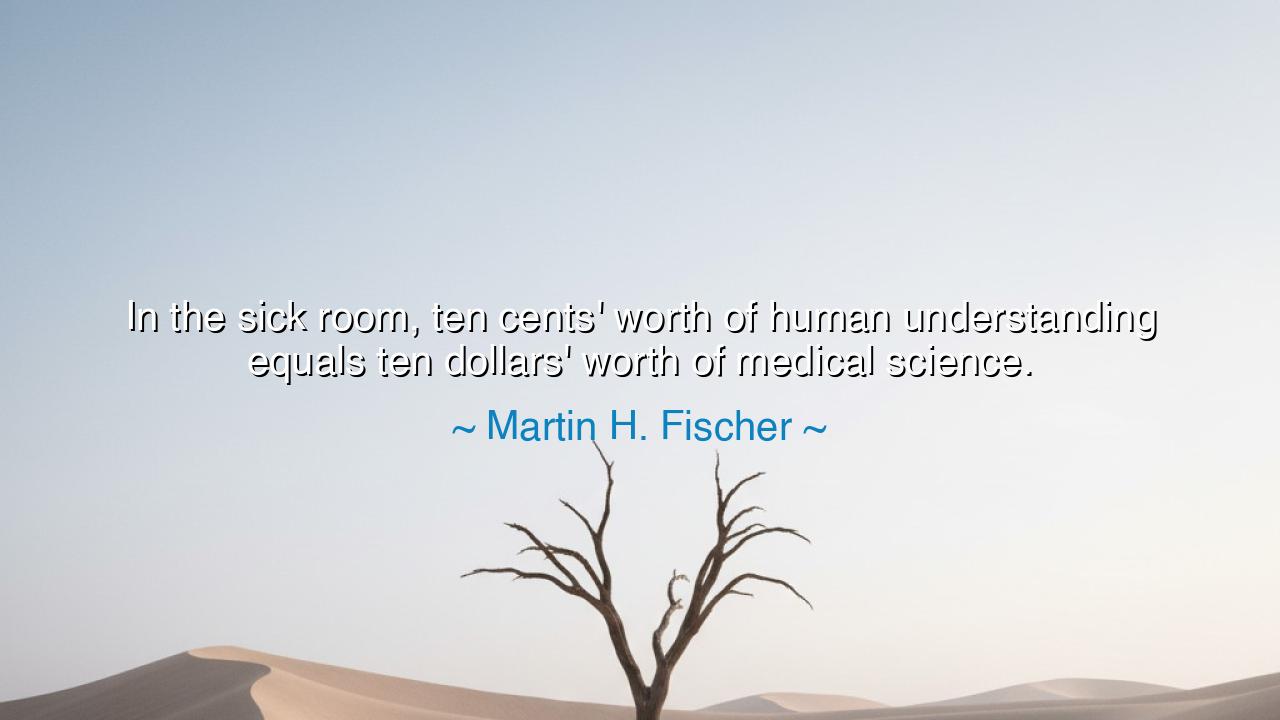
In the sick room, ten cents' worth of human understanding equals
In the sick room, ten cents' worth of human understanding equals ten dollars' worth of medical science.






Hear the wise words of Martin H. Fischer, physician and philosopher, who declared: “In the sick room, ten cents’ worth of human understanding equals ten dollars’ worth of medical science.” At first glance, one might think this a dismissal of science, but it is not. Rather, it is a reminder that in the realm of suffering, where pain and fear weigh heavily upon the soul, the human heart has powers that no instrument, no drug, and no learned diagnosis can replace. For what good is knowledge without compassion, or treatment without tenderness?
The meaning of this truth is clear: while medical science can mend the body, it is understanding that soothes the spirit. A patient does not merely seek the repair of flesh and bone; they crave dignity, presence, and comfort. A kind word, a listening ear, a hand placed gently upon theirs can lift burdens that no medicine can reach. For disease often strikes not only the body but the soul, and the healing of the soul requires the warmth of human sympathy.
The origin of Fischer’s insight lies in his years as a physician and teacher. He saw countless times that patients improved when they were treated not as cases, but as persons. He understood that trust and comfort magnify the power of science, while cold indifference diminishes it. Fischer’s words flow from a long tradition: from Hippocrates who urged physicians to “cure sometimes, relieve often, comfort always,” to the wise healers of every age who knew that mercy is as vital as medicine.
History gives us shining examples. Consider Florence Nightingale, who during the Crimean War transformed the hospitals of the wounded. Her knowledge of sanitation saved many, but it was her human understanding—her tireless presence, her lamp carried through the darkness, her willingness to sit beside the suffering—that healed the spirits of soldiers. Many would later say it was her compassion, as much as her skill, that gave them strength to live. Ten cents of her humanity outweighed mountains of sterile technique.
This truth is not only for doctors and nurses, but for all who encounter the frailty of others. Parents comforting children, friends visiting the bedridden, strangers offering small kindnesses—all become healers when they extend understanding. It is a power available to all, not bound by education or wealth. Even a poor man, with nothing but his voice and his time, can give comfort greater than the richest hospital without love.
The lesson for us is profound: when you meet someone in pain, do not imagine that only the experts can help. Bring your understanding—your patience, your compassion, your willingness to listen. This is worth more than any treasure, more than any technical knowledge, for it nourishes the spirit. And when the spirit is lifted, the body too often follows. Never forget that to heal the heart is to strengthen the whole person.
And so, let your actions follow. If you are called to the side of the suffering, do not rush only to give advice or remedies. Sit with them. Hear their voice. Share in their burden. Offer the medicine of kindness before the medicine of science. For in the end, the greatest healing flows not only from the head but from the heart.
Thus remember always the wisdom of Martin H. Fischer: “In the sick room, ten cents’ worth of human understanding equals ten dollars’ worth of medical science.” Carry this truth with you, and know that even the smallest act of compassion can outweigh the mightiest advance of science, for it reaches the part of us that science alone can never touch.






AAdministratorAdministrator
Welcome, honored guests. Please leave a comment, we will respond soon